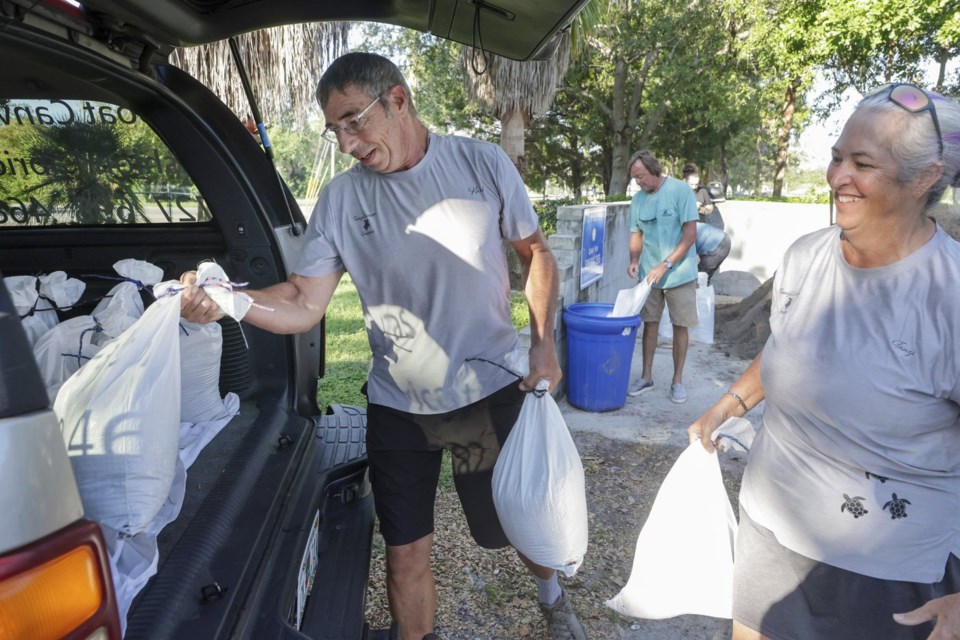Tropical Storm Helene formed Tuesday in the Caribbean Sea and could strengthen into a major hurricane while moving north toward the U.S., forecasters said.
for parts of Cuba, Mexico and a stretch of the Florida coastline, including Tampa Bay, the U.S. National Hurricane Center said. A tropical storm warning has been issued for parts of the Florida Keys.
The storm was located 170 miles (275 kilometers) southeast of the western tip of Cuba and had sustained winds of 45 mph (75 kph). It was expected to strengthen into Hurricane Helene on Wednesday as it approached the Gulf Coast and could become a major hurricane Thursday.
declared a state of emergency Monday ahead of its arrival and increased the counties included in the high-risk area Tuesday from 41 to 61.
Heavy rains and big waves already lashed the Cayman Islands on Tuesday.
âNow is the time to start preparing. If youâre in an evacuation zone, you should evacuate,â said Lisa Bucci, a hurricane specialist at the center. âDonât be fooled by the way the storm looks at the moment. We are expecting it to rapidly intensify.â
She said people in regions under watches and warnings should be prepared to lose power and should have enough food and water for at least three days.
The disturbance is expected to move âover extremely deep and warm watersâ that would fuel its intensification.
âConditions look quite favorable for strengthening over the eastern Gulf of Mexico on Wednesday and Thursday,â the center said. âThis system will become quite large and powerful before landfall.â
Helene could strengthen into a Category 3 hurricane before approaching the northeast Gulf Coast. Since 2000, eight major hurricanes have made landfall in Florida, according to Philip Klotzbach, a Colorado State University hurricane researcher.
Given the anticipated large size, storm surge, wind and rain will extend far from the center of the expected storm, especially on the east side. The center warned of âinland penetration of strong winds over parts of the southeastern United States after landfall.â
Bucci said states including Tennessee, Kentucky and Indiana could see rainfall associated with the storm.
A tropical storm warning was in effect for Florida's Dry Tortugas; the lower Florida Keys west of the Seven Mile Bridge; Grand Cayman; Rio Lagartos to Tulum, Mexico; and the Cuban provinces of Artemisa, Pinar del Rio, and the Isle of Youth.
Meanwhile, a storm surge watch was in effect for Florida's Tampa Bay, Charlotte Harbor and from Indian Pass south to Flamingo. A tropical storm watch was issued for the middle Florida Keys from the Seven Mile Bridge to the Channel 5 Bridge; Flamingo to south of Englewood; and from west of Indian Pass to the Walton Bay County line.
The National Weather Service in Tallahassee, Florida, urged people to take potential evacuations seriously.
â10-15ft of surge is NOT survivable,â it wrote on the social media platform X.
DeSantis said the storm is reminiscent of Hurricane Michael, a Category 5 hurricane that rapidly intensified and caught many residents off guard before plowing a destructive path across the western Panhandle. Communities still rebuilding from previous storms could get battered again, DeSantis warned.
âWe are going to see significant impacts no matter what happens," DeSantis said Tuesday.
Officials in the Cayman Islands shuttered schools and airports as forecasters warned of heavy wind and rain and waves of up to 10 feet (3 meters).
âThe current conditions present significant risk, and we must prioritize our safety,â said Ian Yearwood with the Royal Cayman Islands Police Service.
Meanwhile, many in Cuba worried about the disturbance, whose tentacles are expected to reach the capital of Havana, which is struggling with a severe shortage of water and piles of uncollected garbage.
Overall, roughly 600,000 people in Cuba are experiencing water shortages, including more than 130,000 in Havana alone. Chronic power outages also persist.
The disturbance is expected to slip through waters separating Cuba from Mexicoâs Yucatán Peninsula late Tuesday and then head north to the Gulf Coast.
Up to 8 inches (20 centimeters) of rain is forecast for western Cuba and the Cayman Islands with isolated totals of 12 inches (30 centimeters). Up to 6 inches (15 centimeters) of rain is expected for the eastern Yucatan Peninsula, with isolated total of more than 8 inches (20 centimeters).
Heavy rainfall also is forecast for the southeastern U.S. starting on Wednesday, threatening flash and river flooding, according to the National Hurricane Center. Up to 8 inches (20 centimeters) of rain was forecast for the region, with isolated totals of 12 inches (30 centimeters).
A storm surge of up to 15 feet (5 meters) was forecast from Ochlockonee River, Florida, to Chassahowitzka, and up to 10 feet (3 meters) from Chassahowitzka to Anclote River and from Indian Pass to Ochlockonee River.
Authorities in Mexico offered free ferry service to move tourists off the low-lying coastal island of Holbox. The offer was made Tuesday by Mara Lezama, the governor of the Caribbean coast state of Quintana Roo, home to resorts like Cancun, Playa del Carmen and Tulum. Holbox is known among tourists for its tranquil, shallow waters and flocks of flamingos. It is easily flooded.
Lezama said forecasters predict the storm is expected to move just offshore and not hit land in Mexico.
Helene is the eighth named storm of the Atlantic hurricane season, which runs from June 1 to Nov. 30.
The National Oceanic and Atmospheric Administration has predicted an above-average Atlantic hurricane season this year . It forecast 17 to 25 named storms, with four to seven major hurricanes of Category 3 or higher.
Meanwhile, in the Pacific, , killed two people after it barreled into Mexicoâs southern Pacific coast, blowing tin roofs off houses, triggering mudslides and toppling scores of trees, officials said Tuesday.
___
Coto reported from San Juan, Puerto Rico, and Hollingsworth from Mission, Kansas. Associated Press reporter Andrea RodrÃguez in Havana and Mark Stevenson in Mexico City contributed to this report.
Heather Hollingsworth And Dánica Coto, The Associated Press



